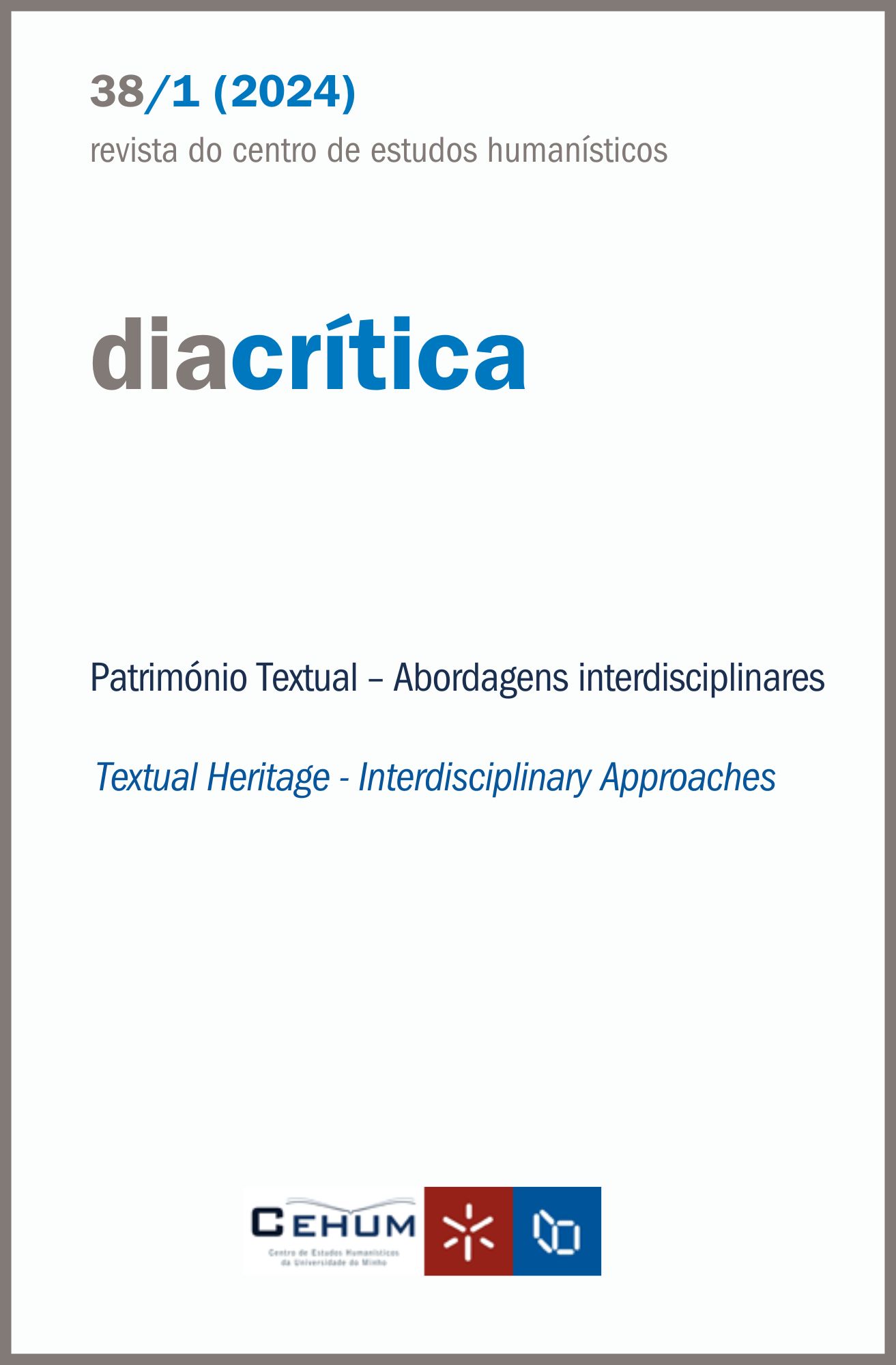The updated edition of Francisco Saraiva de Sousa's “Báculo Pastoral de Flores de Exemplos”
DOI:
https://doi.org/10.21814/diacritica.5437Keywords:
Exemples, Short stories, Báculo Pastoral, Francisco Saraiva de Sousa, ReligionAbstract
In this study, we will present the 17th century work Báculo Pastoral de Flores de Exemplos, by Francisco Saraiva de Sousa, first published in 1624 by Pedro Craesbeeck. The work, whose last edition is from 1738, as it is rare to find and has great interest from a religious, linguistic and literary point of view, is currently the subject of an updated edition, to be released soon. In the present study, we will provide some bibliographical information about the various editions of the work and its author, we will talk about the content (structure, theme, authors cited, etc.), we will mention some graphic and linguistic particularities and we will present the criteria we established for the elaboration of the updated edition. Attached, we will include, as an example, the transcription of Chapter XXVIII of the work, relating to the sin of gluttony.
References
Almeida, João Ferreira de (1681). Dialogo Rustico e Pastoril, Entre o Cura de huã Aldea e hum Pastor de Ovelhas... [Amsterdão].
Coyne, George V. (2005). “The Church's Most Recent Attempt to Dispel the Galileo Myth”. In Ernan McMullin (ed.), The Church And Galileo. Paris: University of Notre Dame Press, pp. 340-359.
Machado, Diogo Barbosa (1747). Bibliotheca Lusitana, tomo II. Lisboa: Na Officina de Ignacio Rodrigues.
Silva, Inocêncio Francisco (1859). Diccionario Bibliographico Portuguez, tomo III. Lisboa: Imprensa Nacional.
Sousa, Francisco Saraiva de (1624). Baculo Pastoral de Flores de Exemplos Divinos. Lisboa: Pedro Craesbeeck Impressor delRey.
Sousa, Francisco Saraiva de (1628). Baculo Pastoral de Flores de Exemplos. Lisboa: Pedro Craesbeeck Impressor delRey.
Sousa, Francisco Saraiva de (1657). Segunda Parte do Baculo Pastoral de Flores de Exemplos. Lisboa: Antonio Alvarez Impressor.
Sousa, Francisco Saraiva de (1676). Baculo Pastoral de Flores de Exemplos. Lisboa: Officina de Antonio Rodriguez d’Abreu.
Sousa, Francisco Saraiva de (1682). Baculo Pastoral de Flores de Exemplos. Lisboa: Officina de Joaõ Galraõ.
Sousa, Francisco Saraiva de (1690). Baculo Pastoral de Flores de Exemplos. Lisboa: Officina de Joaõ Galraõ.
Sousa, Francisco Saraiva de (1698). Baculo Pastoral de Flores de Exemplos. Lisboa: Officina de Antonio Pedrozo Galraõ.
Sousa, Francisco Saraiva de (1719). Baculo Pastoral de Flores de Exemplos. Lisboa: Officina de Miguel Manescal.
Sousa, Francisco Saraiva de (1738). Baculo Pastoral de Flores de Exemplos. Lisboa: Officina de Manoel Fernandes da Costa.
Trancoso, Gonçalo Fernandes (1982). Contos & Histórias de Proveito & Exemplo (1575). Edição fac-similada da impressão de 1575. Lisboa: Biblioteca Nacional.
Vercial, Clemente Sánchez (2000). Libro de los Exemplos por A. B. C. Edição de John E. Keller e Connie L. Scarborough. Madrid: Ars Libris.
Downloads
Published
How to Cite
Issue
Section
License
Copyright (c) 2024 José Barbosa Machado

This work is licensed under a Creative Commons Attribution-NonCommercial 4.0 International License.










